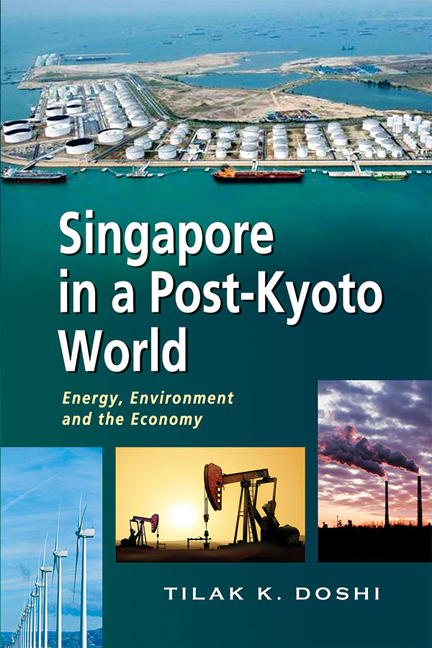Book contents
- Frontmatter
- Dedication
- Contents
- List of Tables and Figures
- Preface
- Acknowledgements
- List of Abbreviations
- Introduction
- 1 Economy, Energy, and Emissions
- 2 Climate Change Negotiations: From Copenhagen to Durban via Cancun
- 3 Climate Change Finance: Who Pays and Who Receives?
- 4 Singapore's External Sector: Impacts of Emission Mitigation Policies
- 5 Energy and Emissions: The Five Strategies
- 6 Concluding Remarks: “The Three E's”
- Index
- About the Author
6 - Concluding Remarks: “The Three E's”
Published online by Cambridge University Press: 19 May 2017
- Frontmatter
- Dedication
- Contents
- List of Tables and Figures
- Preface
- Acknowledgements
- List of Abbreviations
- Introduction
- 1 Economy, Energy, and Emissions
- 2 Climate Change Negotiations: From Copenhagen to Durban via Cancun
- 3 Climate Change Finance: Who Pays and Who Receives?
- 4 Singapore's External Sector: Impacts of Emission Mitigation Policies
- 5 Energy and Emissions: The Five Strategies
- 6 Concluding Remarks: “The Three E's”
- Index
- About the Author
Summary
The somewhat inelegantly termed “trilemma” — the trade-offs among the trio of policy objectives of energy security, environmental sustainability, and economic competitiveness — has given rise to much study and even more contention. The many examples of policy initiatives in various countries discussed in this book give evidence to the costly failures that can result from poorly thought out or populist solutions to energy sector issues, with unintended consequences for social welfare. In many cases, the scale of perverse effects has been such that the very purpose of energy policy is subverted. It is the contention of this book that policy objectives need clear delineation and focus, so that appropriate actions can be formulated and implemented when necessary in a manner which minimizes unintended consequences. The concluding remarks below summarize the arguments offered in earlier chapters on the “three E's” confluence of energy security, environmental sustainability, and economic competitiveness. These remarks end with an impressionistic scorecard for Singapore's performance in achieving its energy policy objectives.
ENERGY SECURITY
“Energy security” is a term that has long bedevilled energy policy debates among politicians, businessmen, and academics. Indeed, the term is evoked by players across the policy spectrum, from the more extreme “green” non-governmental organizations (NGOs) whose constant refrain is of the risks of cataclysmic climate change, to the many business groups and public or private resource owners and users with vested interests across the energy value chain. Being so contested by different political and economic constituencies, the term carries its multi-hued meanings to the point of contradiction. Hence, the call for enhanced energy security is often invoked to support conflicting policy positions. In the United States, proponents of subsidies for alternative energy and electric vehicles invoke the mantra of energy security as forcefully as the politicians who support their local coal-fuelled power stations. While both positions claim to reduce America's dependence on energy imports, their approach to climate change issues could not be more opposed.
- Type
- Chapter
- Information
- Singapore in a Post-Kyoto WorldEnergy, Environment and the Economy, pp. 271 - 288Publisher: ISEAS–Yusof Ishak InstitutePrint publication year: 2015

